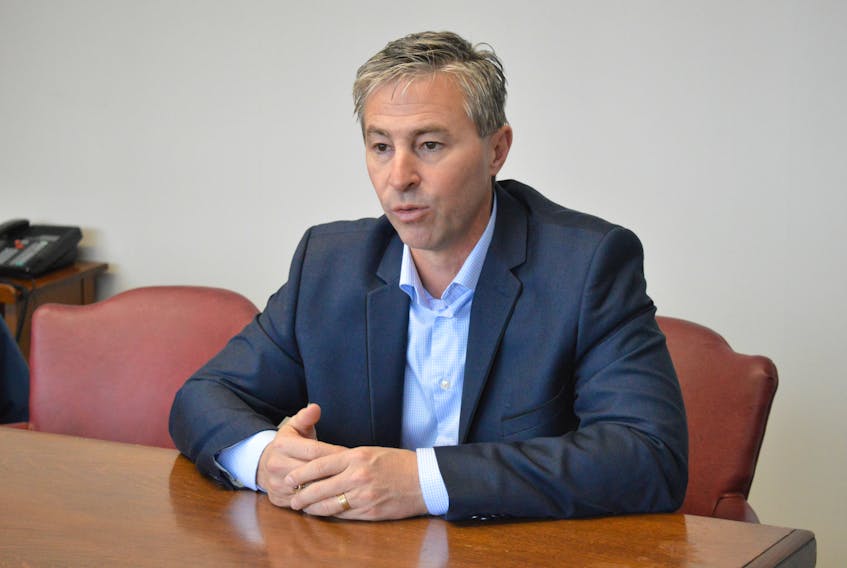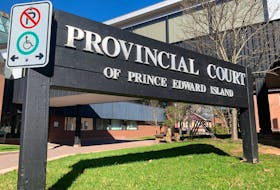SYDNEY, N.S. — Nova Scotia Progressive Conservative leader Tim Houston discussed a number of wide-ranging topics in an interview with the Cape Breton Post when he was in Sydney Wednesday.
Q: You’re getting ready to head into another session of the house. What can we expect, what are your priorities?
A: The house returns on Feb. 20. Health care is the biggest issue in the province, for sure; the economy is always a big question, in the province we have some pressures there with what’s happening in the forestry industry … education, these are kind of the main priorities of our caucus but the main priorities of Nova Scotians, really, and the main responsibilities of the provincial government … The spring session is the budget, too.
Q: The recent statistics for child poverty are disturbing. Nova Scotia has the third-highest child poverty rate in Canada and was the only province to see its rate increase between 2015-17. Why do you feel these numbers are rising and how would you tackle the problem?
A: It is very disturbing. You talk about child poverty you’re also talking about family poverty and community poverty. These things are all pretty distressing to see what’s happening. I know that there are people struggling in this province and those statistics just bear it out that things are getting worse. It’s a reflection of what’s happening in our economy, it’s a reflection of what’s happening in our communities and it’s something that we need to focus on for the long term. These are things that we really need to work on – how is it happening, why is it continuing to happen in our province. I know I’ve heard the premier say that he was surprised by some of these statistics; I’ve heard the Minister of Community Services question the statistics … but I can tell you from travelling around the province and certainly around Cape Breton, it’s a real problem.
I think if we focus on how to grow the economy, that’s kind of the bigger question, long-term. In the short term, I think there are things the government can do to support families more immediately. We do have child tax benefits for low-income families, I think we need to look at that and improve that … that’s something that will help families immediately. There’s other programs as well … there’s definitely policies that we can look at and improve.
The best social program is a job. We need to make sure that people have opportunities in their communities.
Q: Doctors and staff at the Cape Breton Regional Hospital describe the current ER situation as chaotic and unmanageable. How would you address the chronic problems that emergency departments are facing?
A: I’ve seen first-hand the lineups … there’s a good staff there, they’re doing the best they can but they’re certainly under a lot of pressure. They need to be supported. I’ve seen what’s happening there.
There’s a human resource planning issue there for sure and that’s making sure you have access to appropriate staff, but if you look back, the real question is how do people access care, that’s really the question and that’s really the pressure point. If you don’t have a family doctor and you don’t have access to a walk-in clinic and you think you may be sick, you’re ending up at the emergency room and I do think there’s people presenting at the emergency room that, if they could have accessed care through another route, then they would be happier and better-served and it would take pressure off the whole system. One of the things that we’ve been talking about is let’s look at the delivery of care across the province and let’s make sure we modernize it. In lots of other jurisdictions in the world there’s more telephone healthcare – you think you may be sick, you phone up, you may be triaged and then you’re immediately connected to a doctor, a nurse practitioner, it could be a pharmacist.
Q: There are some in the CBRM who are showing interest in the concept of regional autonomy, including a push by Senator Dan Christmas. What is your view about that sentiment?
A: I think what you’re seeing is when people are worried that they’re not being treated fairly by the government, then they look for other alternatives. I think the underlying issue is people are wondering about the question of fairness and the level of services they’re getting and how they’re being viewed upon from the government. This is a great province, it’s always going to be stronger when we’re together and supportive of each other. I would rather focus the discussion on making sure that every area of this province feels welcome, feels like they’re part of something, that they want to be part of something.
Q: You previously committed to doubling what CBRM receives under equalization as an immediate first step. Do you stand by that? What other steps would you take to address the growing gap that CBRM officials have identified between what it received in equalization and what it pays back to the province in mandated costs?
A: Yes. I think that feeds into the question of people making sure that they feel treated fairly and the MOU between the province and the municipalities is very old. It’s over 20 years old and a lot's changed in the world since then and it’s time to modernize that agreement. And there will be lots of moving parts to that discussion around equalization payments to communities, around property taxes, around exchange of services … what I’ve said is as premier I commit to having that discussion, to making that happen … and as a show of commitment to that, I would double the equalization payments to the municipalities across the province while that negotiation is happening.
Q: When do you expect there to be a general election?
A: I’m expecting there will be a general election this year. The way our system works, it’s really at the will of the premier. The premier will make a decision when he feels his party is ready for a general election and he’ll call it. We’re one of the last jurisdictions that don’t have fixed election dates. I think we should have fixed election dates, but until we have those, we’re at the mercy of the premier.
(EDITOR'S NOTE: Answers have been edited for length).









